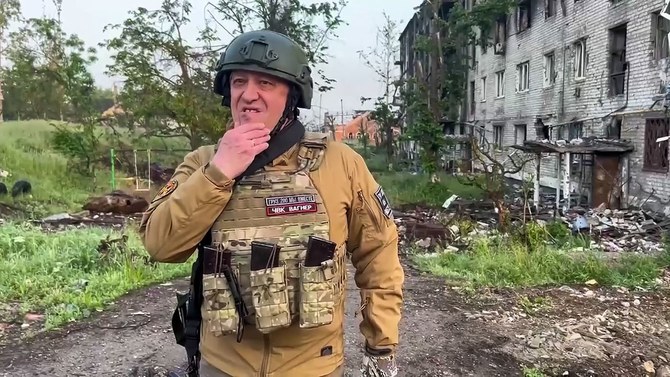TALLINN, Estonia: Mercenary leader Yevgeny Prigozhin, who led a brief armed rebellion against the Russian military earlier this year, was presumed dead Wednesday after a plane crash north of Moscow that killed all 10 people on board.
Prigozhin was on the plane, according to Russia’s civil aviation agency, which cited the airline. The crash immediately raised suspicions since the fate of the founder of the Wagner private military company has been the subject of intense speculation ever since he mounted the mutiny.
At the time, President Vladimir Putin denounced the rebellion as “treason” and a “stab in the back” and vowed to avenge it. But the charges against Prigozhin were soon dropped. The Wagner chief, whose troops were some of the best fighting forces for Russia in Ukraine, was allowed to retreat to Belarus, while reportedly popping up in Russia from time to time.
The crash also comes after Russian media reported that a top general linked to Prigozhin was dismissed from his position as commander of the air force.
A plane carrying three crew members and seven passengers that was en route from Moscow to St. Petersburg went down almost 300 kilometers (185 miles) north of the capital, according to officials cited by Russia’s state news agency Tass.
Russia’s civilian aviation agency, Rosaviatsia, quickly reported that he was on the manifest and later said that, according to the airline, he was indeed on board.
Earlier, Vladimir Rogov, a Russia-appointed official in the partially occupied Zaporizhzhia region in Ukraine, said he talked to Wagner commanders who also confirmed that Prigozhin was aboard, as was Dmitry Utkin, whose call sign Wagner became the company’s name.
“I don’t know for a fact what happened but I’m not surprised,” US President Joe Biden said.

Keir Giles, a Russia expert with the international affairs think tank Chatham House, had urged caution about reports of Prigozhin’s death. He said “multiple individuals have changed their name to Yevgeniy Prigozhin, as part of his efforts to obfuscate his travels.”
Flight tracking data reviewed by The Associated Press showed a private jet that Prigozhin had used previously took off from Moscow on Wednesday evening and its transponder signal disappeared minutes later.
The signal stopped suddenly while the plane was at altitude and traveling at speed. In an image posted by a pro-Wagner social media account showing burning wreckage, a partial tail number matching a jet previously used by Prigozhin could be seen.
Videos shared by the pro-Wagner Telegram channel Grey Zone showed a plane dropping like a stone from a large cloud of smoke, twisting wildly as it fell. Such freefalls can occur when an aircraft sustains severe damage, and a frame-by-frame AP analysis of two videos was consistent with some sort of explosion mid-flight. The images appeared to show the plane was missing a wing.
ALSO READ: Wagner mercenary leader, Russian mutineer, ‘Putin’s chef’: The many sides of Yevgeny Prigozhin
Russia’s Investigative Committee opened an investigation into the crash on charges of violating air safety rules, as is typical when they open such probes. Interfax, citing emergency officials, reported early Thursday that all 10 bodies had been recovered at the site of the crash and the search operation had ended.
Even if confirmed, Prigozhin’s death is unlikely to have an effect on Russia’s war in Ukraine, where his forces fought some of the fiercest battles over the past 18 months.
His troops pulled back from front-line action after capturing Bakhmut, a city in the eastern Donetsk region, in late May. Bakhmut had been the subject of arguably the bloodiest battles in the entire war, with the Russian forces struggling to seize it for months.
After the rebellion, Russian officials said his fighters would only be able to return to Ukraine as part of the regular army.

Yevgeny Prigozhin and his mercenary Wagner Group soldiers post for a picture in the battlefield of Bakhmut, Ukraine, in May 2023, just days before they mounted a mutiny against the Kremlin. (AFP / file photo)
This week, Prigozhin posted his first recruitment video since the mutiny, saying that Wagner is conducting reconnaissance and search activities, and “making Russia even greater on all continents, and Africa even more free. ”
Also this week, Russian media reported, citing anonymous sources, that Gen. Sergei Surovikin was dismissed from his position of the commander of Russia’s air force. Surovikin, who at one point led Russia’s operation in Ukraine, hasn’t been seen in public since the mutiny, when he recorded a video address urging Prigozhin’s forces to pull back.
As news of the crash was breaking, Putin spoke at an event commemorating the Battle of Kursk, hailing the heroes of Russia’s war in Ukraine.
Tatiana Stanovaya, a senior fellow at the Carnegie Russia Eurasia Center, said on Telegram that “no matter what caused the plane crash, everyone will see it as an act of vengeance and retribution” by the Kremlin, and “the Kremlin wouldn’t really stand in the way of that.”
“From Putin’s point of view, as well as the security forces and the military — Prigozhin’s death must be a lesson to any potential followers,” Stanovaya said in a Telegram post. According to her, after the mutiny, Prigozhin “stopped being the authorities’ partner and could not, under any circumstances, get that status back.”
“He also wasn’t forgiven,” Stanovaya wrote. “Prigozhin was needed for some time after the mutiny to painlessly complete the dismantling of Wagner in Russia.” But overall, “alive, happy, full-of-strength and full-of-ideas Prigozhin was, definitely, a walking source of threats for the authorities, the embodiment of Putin’s political humiliation.”
Stanovaya doesn’t expect much public outcry over Prigozhin’s death. She said those who supported him will be “more scared than inspired to protest,” while others would see it as a “deserved outcome.”
























